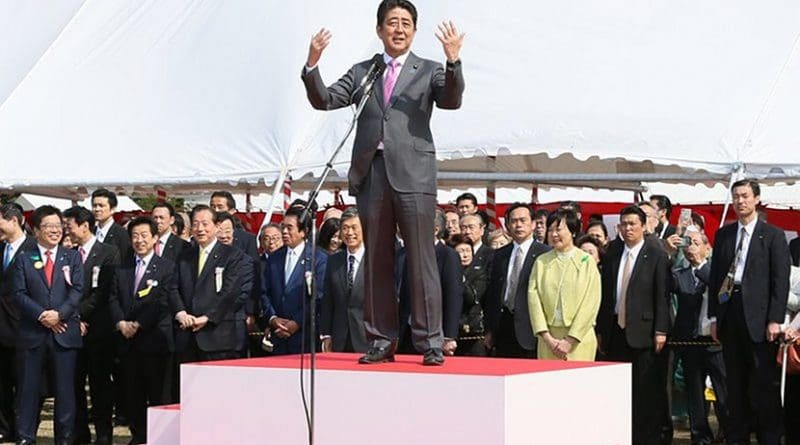Abe Well-Set For A Record Third Term Party Presidency? – Analysis
By Observer Research Foundation
By K. V. Kesavan
In the midweek of this month, the Liberal Democratic Party of Japan is scheduled to hold election for the party presidency and the present incumbent Shinzo Abe is contesting again for the post for the third time which is unprecedented. If elected, he will hold the party presidency as well as the prime ministership until 2021. He will set a new record as the prime minister holding the longest tenure in Japan’s political history. Till 2017, a party president could hold the office only for two terms. But since then, the party rules have been amended to give one more term to the incumbent.
In the 20 September election, pitted against Abe is another long-standing LDP leader, Shigeru Ishiba who has held key positions both in the party and government. Younger than Abe, Ishiba had unsuccessfully challenged him in the 2012 party presidential election.
What adds an extra element of interest to the present contest is that it is a straight fight between two party stalwarts. Some of the aspirants like Fumio Kishida and Ms. Seiko Noda, who were expected to contest, withdrew at the last moment. Kishida, former foreign minister, long considered as a potential successor to Abe, chose to wait in the wings for some time instead of trying his luck right now. He took that decision because “it would be more appropriate to deal with the various political issues facing us under a structure centered on Prime Minister Abe.” Ms. Noda, presently construction minister under Abe, could not gather the requisite 20 Diet members to sponsor her candidature. Both of them know that if they contest and lose, there is a real risk of being marginalised by the winner.
In recent years, a minimum of three candidates have contested in the presidential elections since a straight fight between two candidates could generate a great deal of heat contributing to tensions in the intra-party management after the election. One has to wait and see how much the intra-party atmosphere would be affected by the Abe-Ishiba contest.
As per the party rules, the president is elected by a combination of Diet members and registered party members from the prefectures across the country. Presently, there are 405 voting members under each category. Abe is reported to have secured the support of a large number of Diet members who belong to different factions. In LDP politics, it is well-known that factions play a key role in the election of the party president. Since no single faction is large enough to win the election on its own strength, three or four factions come together to support a common candidate and form the so-called mainstream factions with an eye on capturing power. In addition to his own faction (Hosoda faction) which is the largest, Abe is strongly supported by other factions led by Taro Aso (finance minister), Fumio KIshida (LDP’s chairman, Policy Council Research), Toshihiro Nikai (party executive chief ) and Nobuteru Ishihara besides a major chunk of the Takeshita faction. This means Abe is likely to garner more than 75% of the 405 votes of the lawmakers.
As for the 405 party representatives, both Abe and Ishida have vigorously travelled across the prefectures to canvass their support. One may recall that in the 2012 presidential election, Ishiba succeeded in gathering huge support from the party representatives. He polled 55% of the local votes as against 29% gathered by Abe. But this time around, it is reported that Abe is enjoying their support in majority of the prefectures. Both contestants will maintain the tempo of their campaign until the last day.
Opinion polls conducted by major newspapers like the Asahi and the Mainichi suggest that Abe would be able to win his third term fairly comfortably. While there is a good deal of public criticism about Abe’s involvement in certain financial and personal controversies like the Kake and Moritomo issues, many still concede that Abe has provided a certain degree of stability to Japanese politics and a strong leadership to the LDP. In support of this, they cite how Japan was hampered by political instability during 2007-12, when there were more than six prime ministers.
The third term will definitely fulfil Abe’s political ambition to be Japan’s longest serving prime minister. He had made all arrangements to achieve his aim when he amended the party rules last year to provide for a third term to the incumbent president. One overarching consideration at that time was that Abe was keen to amend the Japanese Constitution when he was at the helm. But in the meantime, Abe was grappling with two major political controversies that seriously implicated him personally and Abe could not push the constitutional amendment with the kind of vigour he displayed earlier. Even now, public opinion on the issue is very sharply divided and Abe will have to work hard to build a national consensus on the issue. Apart from Ishiba who is not enthusiastic about the amendment, many of the faction leaders like Kishida would advise Abe to move with caution in the matter. In addition, the issues that will keep Abe extremely busy include the next Upper House election in July next year, the abdication of the Heisei Emperor, US protectionist policies, North Korea and the abduction issue, the contemplated increase of consumption tax and the 2020 Olympic Games.

